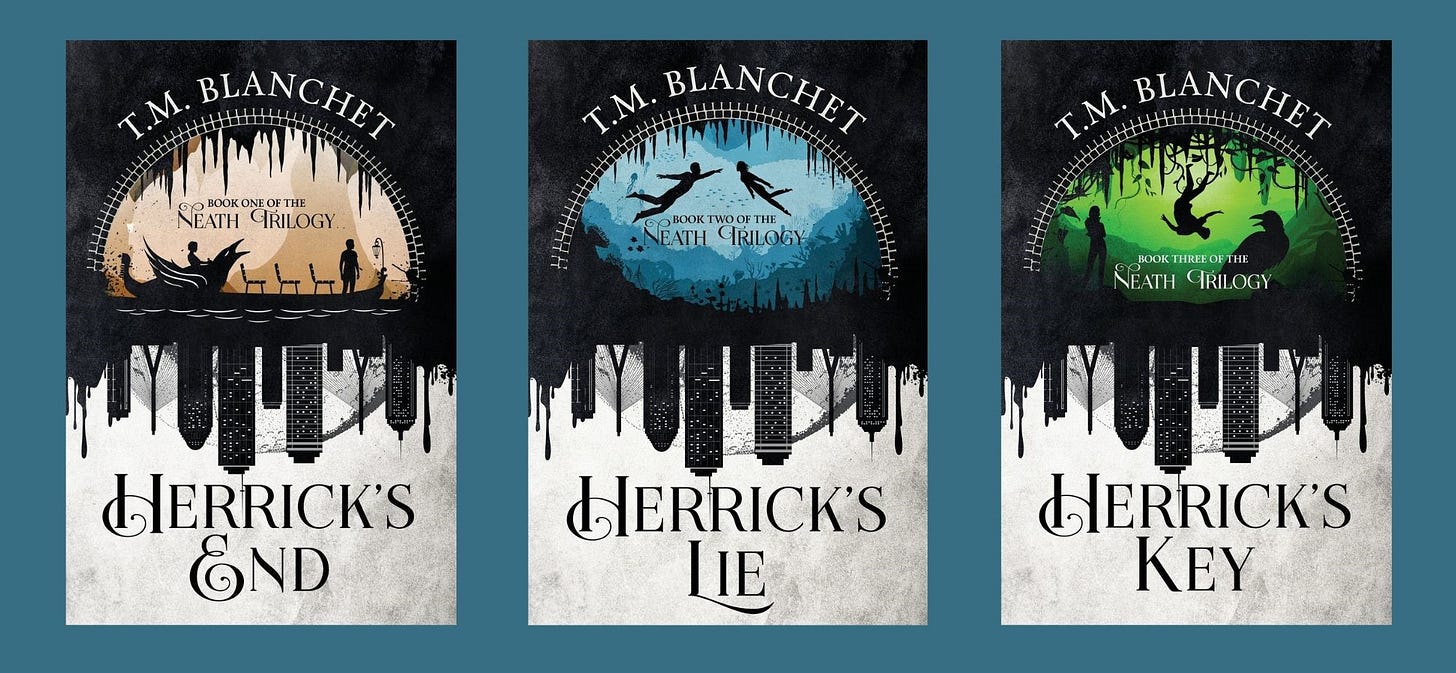The Heart Wants What the Heart Wants
Tenacity Tale: T. M. Blanchet on the tenacity of her imagination
Our June Tenacity Tale is T.M. Blanchet, author of Herrick’s End (2021), Herrick’s Lie (2022), and Herrick’s Key (2024), Books 1, 2, & 3 of The Neath Trilogy, a portal fantasy that Kirkus Review called “a thoughtful and empowering hero’s journey.” Blanchet is also a former reporter, magazine editor, producer and host of A Mighty Blaze podcast, and the founder of Operation Delta Dog, a nonprofit that rescues shelter dogs and trains them to work as service dogs for veterans. You can help Delta Dogs win a $50,000 grant from SpotOn Gives by voting for their video package by 9 p.m. tonight! All you have to do to vote is click on the big blue button in the middle of this page.
In T.M. Blanchet’s Herrick’s End, the woman that 19-year-old Ollie Delgato has a crush on disappears, but when he sets out to find her, the trail leads him straight out of a North End filled with creature comforts—like gelato and alfredo—and into the underground world of the Neath that’s mostly just filled with creatures—like giant sentient crows that power the boats in this underground world’s answer to swan boats.
And that’s just one of the other-worldly creatures that populate the Neath, but to describe more would spoil surprises in a book where half the fun is in discovering what’s around the next corner—think Oz and Narnia but in a cavernous world deep under our own.
Writing any book requires imagination, but writing a portal fantasy trilogy requires true tenacity of the imagination.
“Publishing three books in three years was intense,” Blanchet said. “Book two was the hardest to write because you have to sum up what happens in book one in a way that’s not boring, offer a freestanding adventure in case this is the only book of the series someone was going to read, and set the pieces in place for book three.”
Hard as book two was to write, book three was no picnic either—the publication schedule demanded that Blanchet write the final installment while she was still editing book two.
“I was basically panicked until [the entire trilogy] sat on the shelf.”
But while writing a fantasy trilogy is an undeniably tenacious act, a quieter tenacity sustained Blanchet through the eleven—yes eleven—unpublished novels she wrote in the decades before the Neath, starting with the moment that reading Harriet the Spy blew her mind as a child.
“I wanted to know what made me want to read that book over and over again,” Blanchet said. “It was like a magic trick, and I wondered if I could do that too.”
So, she started to write short stories and then graduated to books, mostly mimicking what she loved best. After reading Robert Ludlum, she devoured every spy novel she could find and decided she’d be the next Ludlum. After reading Anna Quindlen, she decided Quindlen was the writer she should be, and never mind that Quindlen was already doing a top-notch job of being Quindlen herself.
“It took me a long time to understand that you have to have your own voice.”
A very long time.
“I wrote eleven novels before the Neath that will never be read. They shouldn’t be read. They were practice novels that were not good enough. But the problem with practicing novel writing is you have to write a whole damn novel and it takes you a year or five years.”
Blanchet finally found her voice when she started to brainstorm about why the year-round residents were unfriendly to the summer people in a nearby seaside town.
What if the reason the year rounders weren’t welcoming was because they were actually witches who couldn’t let the summertime people learn their secret? And what if they called themselves switches instead of witches to lie low? And what if the main switch was an Irish woman who went by the name of Kelly Kelly?
The answer was a novel called SWITCHCRAFT.
“Writing in a setting that looks like our world but has an undercurrent of magic that only certain people know about and used really flipped my switch,” Blanchet said. “You can tell when something clicks, and I knew this was working. I’d found my voice.”
The book caught the eye of an agent who was confident she could sell it, and she might have, if Blanchet were willing to make one fundamental change.
Every editor Blanchet’s agent showed loved the book.
They loved the story.
They loved the twist.
They loved the characters.
What they didn’t love was the protagonist’s happy marriage. The book needed a love story, they said. If Blanchet would agree to rewrite the character as a divorcee or single lady enmeshed in a romantic subplot, she’d have herself a book deal.
But Blanchet didn’t want to write about a divorcee finding love—she quite liked her book had to say about the importance of female friendship.
“From a feminist viewpoint it infuriated me—if I was a man, they wouldn’t have told me to add a love story,” Blanchet said. “If I’d agreed to rewrite it, I could have had that on the shelves, but I dug my heels in and decided to wait for the editor who could see the value of a story about friendship.”
But that editor never materialized.
Even after Blanchet’s agent retired and she signed with a new agent excited to send the book back out into the world, the response was the same.
No love story—no deal.
“I decided to quit writing and start a nonprofit1 where I had to work 10 to 15 hours a day,” Blanchet said. “But writing is a disease that you can’t cure, so stories were always brewing in my mind. And a story becomes a page, and a page becomes a chapter, and a chapter becomes a book, and that’s how Herrick’s End came about.”
But by the time she was ready to query Herrick’ End, a lot of the agents interested in fantasy were only interested in young adult novels, so the then twenty-something Ollie wasn’t going to cut it. As an experiment, Blanchet dropped Ollie’s age to 19 and changed nothing else.
“Within two weeks I had a publisher.”
And then that publisher asked if the book could be a trilogy and Blanchet spent the next three years—and 967 pages—in the Neath so that we could all visit there ourselves.
But now that she’s closed the book on Neath, what’s next?
A brand-new story with a premise so fresh it lights Blanchet up.
“I wake up in the morning and run to my laptop,” she says. “I can’t wait to bring this to life. To see the parts become a whole. I wish I wanted to be a nurse. I truly do, but the heart wants what the heart wants.”
The Opening of Herrick’s End, The Neath Trilogy Book 1
Salem Village, Massachusetts Bay Colony
May, 1692
The horses kicked up clouds of dust as they traveled the narrow dirt road, dragging the cart behind them. One driver, three passengers. The women’s wailing drowned out every other sound on the grassy hill.The driver stared straight ahead, snapping the reins with tight precision as his prisoners sobbed and implored him for mercy. They also bellowed prayers and, he suspected, incantations of a more suspicious sort. He paid them no heed. The women had been examined; some had even confessed. Anything they said now surely came from Satan’s mouth, designed to deceive. But he would not be fooled. He had work enough to do in this earthly realm, difficult and underpaid, without partaking in the devil’s work, as well.
The Opening of Herrick’s Lie, The Neath Trilogy Book 2
The Neath
Present Day
Herrick’s End was just the beginning.Which made no sense, of course. The word “end” was right there in the name. But that was how things seemed to go in the Neath, sometimes. Most of the time. Highs were lows, strangers were saviors, the unimaginable was imagined. And ends didn’t even know enough to stay where they belonged.
This was not, generally speaking, a good sign. Everybody’s heard of happy endings. Happy beginnings? Not so much.
The Opening of Herrick’s End, The Neath Trilogy Book 3
Boston, Massachusetts
Present Day
Someone was watching.That was Ollie’s first coherent thought, after the shock wore off. After he had climbed out from among the dead at Copp’s Hill Burying Ground, stepped into the astonishingly bright sunshine, and steadied himself on both feet.
Someone was definitely watching. The awareness squeezed him like a blood-pressure cuff, insistent and uncomfortable.
But who?
Tenacity Tales is HIBOU’s monthly celebration of the tiny tenacities in a writerly life. If you have a tenacity tale you’d like to share, comment below or send me your pitch at hibou@substack.com. To learn more about what we’re looking for, read the original Tenacity Tale here.
Subscribe to HIBOU for regular—and free!— content about writers on the hunt for the wise (and wisecracking) writing life!
None other than Operation Delta Dog, a nonprofit that rescues shelter dogs and trains them to work as service dogs for veterans. At the risk of repeating myself, you can help Delta Dogs win a $50,000 grant from SpotOn Gives by voting for their video package by 9 p.m. tonight! All you have to do to vote is click on the big blue button in the middle of this page.





